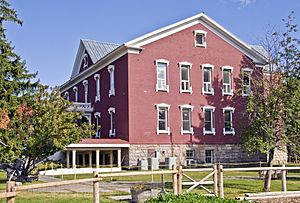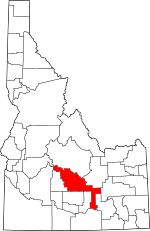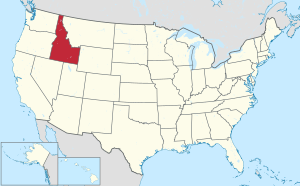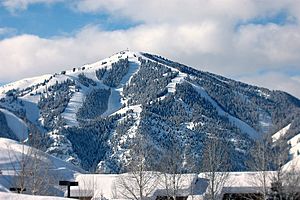Blaine County, Idaho facts for kids
Quick facts for kids
Blaine County
|
||
|---|---|---|

Blaine County Courthouse
|
||
|
||

Location within the U.S. state of Idaho
|
||
 Idaho's location within the U.S. |
||
| Country | ||
| State | ||
| Founded | March 5, 1895 | |
| Named for | James G. Blaine | |
| Seat | Hailey | |
| Largest city | Hailey | |
| Area | ||
| • Total | 2,661 sq mi (6,890 km2) | |
| • Land | 2,644 sq mi (6,850 km2) | |
| • Water | 17 sq mi (40 km2) 0.6% | |
| Population
(2020)
|
||
| • Total | 24,272 |
|
| • Density | 9.1/sq mi (3.5/km2) | |
| Time zone | UTC−7 (Mountain) | |
| • Summer (DST) | UTC−6 (MDT) | |
| Congressional district | 2nd | |
Blaine County is a county located in the beautiful state of Idaho. In 2020, about 24,272 people lived there. The main city and county seat is Hailey. Blaine County is also famous for being home to the Sun Valley ski resort, which is right next to the town of Ketchum.
Blaine County was officially created on March 5, 1895. It was formed by combining parts of two older counties, Alturas and Logan. The county was named after James G. Blaine, who was a well-known politician and even ran for president in 1884. The county's current borders were set in 1917 when a part of it became Camas County.
Contents
History of Blaine County
The area known as the Wood River Valley, which is now in Blaine County, became part of Alturas County way back in 1864. In the 1880s, this valley was a busy place for mining. Because so many people moved to the Wood River Valley, the main office of Alturas County was moved to Hailey in 1882. The old county seat, Rocky Bar, eventually became a ghost town.
When Blaine County was first created in 1895, it was much larger than it is today. Just 13 days after it was formed, a new county called Lincoln County was made from part of Blaine. Later, Lincoln County itself was divided to create other counties like Gooding (1913), Minidoka (1913), and Jerome (1919). Then, in 1917, Camas County was also formed from Blaine County, making it even smaller.
The strong mining business of the 1880s started to slow down by 1890, which was when Idaho became a state. To bring new life to the area, Blaine County began to focus on tourism. In 1936, the famous Sun Valley resort opened. It was first owned by the Union Pacific Railroad. Sun Valley quickly became a popular spot for celebrities. Famous people like writer Ernest Hemingway lived in the area; he is buried in the Ketchum Cemetery. Other celebrities who have lived in Blaine County include actor Adam West, actress Demi Moore, and politician John Kerry.
Life in Blaine County
Most people in Blaine County live in the Wood River Valley. This area is along State Highway 75 in the western part of the county. All the main cities and towns are here, except for Carey. Carey is in the south-central part of the county, where US 20 meets US 26 and US 93. There's also a less populated area in the southeast, sometimes called the "Yale area," which looks like a narrow strip of land.
Because Blaine County is home to a big ski resort, living here can be more expensive than in nearby areas. The average cost of a home is more than double the state average. This means that many people who work in Blaine County choose to live in other towns, like Shoshone in nearby Lincoln County. It's estimated that about 2,540 people travel from outside the county to work in Blaine County every day. The "Yale area" is a unique part of the county. It's thought that this strip of land was included so the county could collect tax money from a Union Pacific railroad line that ran through it.
Geography
Blaine County covers a total area of about 2,661 square miles. Most of this (2,644 square miles) is land, and only about 17 square miles (0.6%) is water.
Neighboring Counties
- Butte County – to the northeast
- Bingham County – to the east
- Power County – to the southeast
- Cassia County – to the south
- Minidoka County – to the southeast
- Lincoln County – to the south
- Camas County – to the west
- Elmore County – to the northwest
- Custer County – to the northwest
Main Roads
Protected Natural Areas
- Craters of the Moon National Monument (part)
- Minidoka National Wildlife Refuge (part)
- Salmon-Challis National Forest (part)
- Sawtooth National Forest (part)
- Sawtooth National Recreation Area (part)
- Hemingway–Boulders Wilderness (part)
- Sawtooth Wilderness (part)
Population Information
| Historical population | |||
|---|---|---|---|
| Census | Pop. | %± | |
| 1900 | 4,900 | — | |
| 1910 | 8,387 | 71.2% | |
| 1920 | 4,473 | −46.7% | |
| 1930 | 3,768 | −15.8% | |
| 1940 | 5,295 | 40.5% | |
| 1950 | 5,384 | 1.7% | |
| 1960 | 4,598 | −14.6% | |
| 1970 | 5,749 | 25.0% | |
| 1980 | 9,841 | 71.2% | |
| 1990 | 13,552 | 37.7% | |
| 2000 | 18,991 | 40.1% | |
| 2010 | 21,376 | 12.6% | |
| 2020 | 24,272 | 13.5% | |
| 2023 (est.) | 25,041 | 17.1% | |
| US Decennial Census 1790–1960 1900–1990 1990–2000 2010–2020 2020 |
|||
In 2010, there were 21,376 people living in Blaine County. Most people (84.9%) were white. About 20% of the population was of Hispanic or Latino background. The average age of people in the county was 40.4 years old. The average income for a family was about $73,929. About 9.3% of the population lived below the poverty line.
Education
Most public schools in Blaine County are managed by the Blaine County School District 61. This school district covers the entire county. There are three public high schools: Wood River High School in Hailey, Carey School in Carey, and Silver Creek High School also in Hailey. Syringa Mountain School is the first charter school in Blaine County; it opened in 2014.
Students who live in the rural Yale area (the southeastern panhandle) go to schools in Minidoka County. The Blaine County school district pays money to the Minidoka district for these students.
There are also private schools like Community School in Sun Valley and The Sage School in Hailey. For higher education, the College of Southern Idaho has an outreach center in Hailey.
Communities
Cities
Census-designated place
- Gannett
Unincorporated communities
- Cathedral Pines
- Doniphan
- Galena
- Gimlet
- Picabo
- Triumph
- Sawtooth City
- Stanton Crossing
- Tikura
Ghost towns
- Boulder
- Vienna
Local Events and Festivals
Blaine County hosts several fun events throughout the year. These include Wagon Days, the Trailing of the Sheep Festival, the Sun Valley Harvest Festival, and the Sun Valley for the Arts Wine Auction. The Blaine County Fair is also a popular annual summer event.
See also
 In Spanish: Condado de Blaine (Idaho) para niños
In Spanish: Condado de Blaine (Idaho) para niños
 | Calvin Brent |
 | Walter T. Bailey |
 | Martha Cassell Thompson |
 | Alberta Jeannette Cassell |



